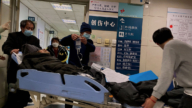【新唐人2013年08月07日讯】近期,世界第三大制药商葛兰素史克公司,在中国大陆贿赂中共官员和医生的丑闻被曝光,也将中国医疗系统触目惊心的腐败内幕赤裸裸的呈现在了民众眼前。有分析指出,收取回扣和红包已经成为中国医疗系统的润滑剂和生命线。在现有的中共体制下,有良心的医生却只能成为“另类”而无法生存,医疗行业的全面腐败也成为必然。
据中共喉舌《新华社》的报导指称,葛兰素史克中国公司为行贿医生,建立了一套完整的报销模式,通过虚报会议、学术讲座和直接提供现金等方式行贿,达到提高药品销量的目的。
葛兰素史克在中国大陆行贿并非个案。近年来,辉瑞、礼来等多家外资药企都因涉嫌在华行贿受到调查。这些外企在本国大都守法经营,却都无法避免在中国被“潜规则”同化。
《财新网》分析指出,这种现象反映出了中国医药体系的行业弊端。
大陆某市主治医师李敬(化名)也认为,中国医疗行业的运行体制下,层层的所谓招标和监管制度,却使药品在众多流通环节中不断成为贪腐的工具。
大陆某市主治医师李敬(化名):“正规的医院需要通过国家招标才能把药品引进来。如果药厂想要进入医院的话,首先要进入国家的招标工作,需要一些手段才能进去。然后医院再从招标目录里再进入医院渠道,医药代表或是药方、厂商就要打通医院的院级领导和药剂科。”
《燕赵晚报》评论文章认为,大陆医药领域贿赂从国家及医疗机构一直到乡镇卫生院,几乎不存在太多的净土,以至于拒绝并揭秘潜规则的“极个别”医生反倒成了另类而混不下去。
时事评论员邢天行表示,中共以文革等各种手段摧毁了中国人的道德体系后,导致各行业中,有良知的从业者难以生存,医疗行业的全面腐败也成为必然。
时事评论员邢天行:“你翻开中国古代那些医书,那些有名的医生他留下来的道德都是很讲究的,就是在选拔这个徒弟上。尤其是他整个普遍社会的道德文化都是讲究善恶有报的,人命关天,所以对人的生命是一定要关注的。现在到了中共这个时期就是把传统文化,尤其是医德和善恶有报这个彻底摧毁了。”
最近曝光的福建漳州“医疗腐败案”,被揭露出药品价格里面80%都是“公关费用”,全市区县73家医院百分之百涉案。中共国务院医改专家咨询委员会委员李玲也坦言,这是全国普遍现象,漳州只是冰山一角。
大陆医疗机构官员赵庆海(化名)指出,行政机关和政府公务人员受贿是医疗系统腐败的源头。
大陆医疗机构官员赵庆海(请变音):“他讲‘全军覆没’他是要保护那些高管才会喊‘全军覆没’的。医生的受贿是领导要他受贿,给他创造受贿的条件。为什么领导要给他创造受贿的条件呢?是领导要受贿。他一个人受贿的话大夫会举报他,所以他让大夫也受贿。苦的是老百姓,它形成一个受贿利益集团。”
英国《路透社》文章则指出,贿赂已经成为一种能够帮助中国公立医院维持运作的润滑剂。对于中国医疗系统的混乱和丑陋,当局有着不可推卸的责任。
文章引述一位在医药行业工作长达15年的高管指出,贿赂和贪污已经蔓延到公立医院的各个层面。在当前的医疗体系,贿赂已经被当做是必需品。
采访/常春 编辑/李明飞 后制/王明宇
Moral Collapse of China’s Medical System
Recently, the world’s third-largest drug manufacturer
GlaxoSmithKline (GSK)’s bribery of Chinese
officials and doctors was exposed, revealing to the public
the shocking crimes of China’s medical system.
Analysts say that kickbacks and money under the table
have become the lifelines of China’s healthcare system.
In the current Chinese Communist Party (CCP) regime,
conscientious doctors are ‘outsiders’ and cannot survive.
Some say the complete corruption of the
healthcare industry is inevitable.
According to the CCP mouthpiece, Xinhua News Agency,
GSK’s China operations established a complete reimbursement
model to bribe Chinese doctors by giving false information in
meetings, academic lectures and cash, to improve drug sales.
Cases of bribery such as GSK’s aren’t uncommon in China.
In recent years, Pfizer, Eli Lilly and a number of other foreign
pharmaceutical companies have been investigated for bribery.
Most of them are law-abiding in their home countries,
but they can’t avoid influence from China’s ‘unspoken rules.’
Writers at Caixin.com, a financial website, say that this reflects
the drawbacks of the medicine and drug industry in China.
Physician Li Jing (a pseudonym) from China also believes
that the system of China’s medical industry,
with its levels of so-called bidding and regulatory systems,
causes drugs to be a tool of corruption in
its many circulation channels.
Li Jing, physician: “Regular hospitals can only import drugs
through a country’s bidding process.
If drug manufactures want to enter hospitals,
they first need to enter the country’s bidding process,
through some means.
Then they can get into the channels of the hospital.
Drug manufacturers must get through hospitals’ leadership."
A report by Yanzhao Evening News says
there is not much pure land in China’s medical system.
Corruption exists from the national level to local villages.
Doctors who refuse to abide by the ‘unspoken rules’ are very few,
and have become outsiders and failures in the system.
Commentator Xing Tianxing says that
the CCP has destroyed people’ morality through
the Cultural Revolution and other political movements.
People with good conscience can’t survive in any area.
The total corruption of the healthcare industry is inevitable.
Commentator Xing Tianxing: “Ancient Chinese
medical books all talk about morality.
The overall society believed in retribution for one’s deeds.
They even selected students based on morality.
The CCP era has completely destroyed doctors’
morality and the belief of retribution.”
In a recently exposed medical corruption case in Zhangzhou,
Fujian province, 80% of drug prices were ‘public fees.’
All of the city’s 73 hospitals were involved in the scam.
Li Ling, a member of China’s State Council Medical Reform
Advisory Committee says that this is a common phenomenon.
Zhao Qinghai (a pseudonym), an official in China’s
Medical System says that
the source of corruption in the medical system is
executives’ and government officials’ taking bribes.
Zhao Qinghai: “It’s failed completely, even high level executives.
Doctors follow the orders from their superiors to take bribery.
Why do their leaders create the conditions for accepting bribes?
Because they also want bribes. It’s formed these interest groups.
It’s everyday people who suffer from all this.”
An article from Reuters pointed out that bribery has become
a way to help China’s public hospitals operate.
The CCP authorities cannot shed responsibility for
the chaotic and ugly state of China’s medical system.
The article quoted an executive who worked for 15 years
in the medical field as saying that bribery and corruption has
spread to all levels of public hospitals.
In China’s current health care system,
bribery has become a necessity.




























